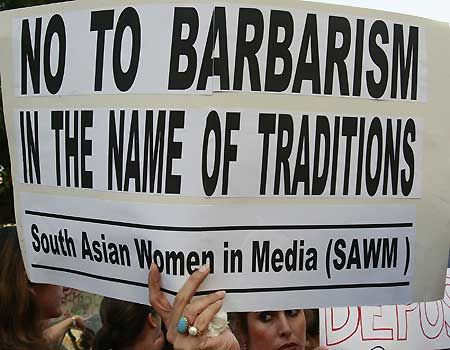Over here in the Gulf states, there’s a wretched little practice called “Blood money.” Say you’re driving home and you just don’t feel like paying attention to the road. Say you drive over a poor guy from India or Pakistan and kill him. In developed countries, if it can be proven you were negligent, you’d be facing jail time. Over here, you might merely be facing a credit card bill. That’s because Islamic law as practiced within the Gulf states allows a victim’s family the choice to demand cash from the perpetrator in lieu of jail or execution.
The perverse rule here is that the rich (0r those backed by the rich) may kill as they like so long as they do it to families desperate enough to accept cash over justice. It does not order society any better, and yet remains both unchallenged and popular. This is not a simple matter of the sheikhs taking good care of themselves, but of whole societies agreeing on this very topic.
And if there were elections allowed here, blood money reform would not appear on them. Democracy, in other word, would hardly liberalize anything.

Pretty horrible thinking. But some elites will think its more dangerous to take on a bad cultural practice than simply ignore it.
And one might well see such a thing in Pakistan over honor killings
Up to 1000 women die a year in Pakistan over what are termed “honor killings.” When that poor woman was murdered by her evil little family in Lahore last week, it was merely a more public version of what happens across the country each year. Even though Pakistan is a functioning democracy, honor killings remain rife and largely unchallenged. Regular people use them all the time to enforce social norms. The question is – why?
Culture is that thing that’s supposed to tell us what to do about problems long before we encounter them
Culture is a prescribed set of behaviors for a given group of people. It tells you who to marry and when, how you can have a good marriage vs. a bad one, what kinds of people are good and what kinds are bad, and has an answer to pretty much every social choice you’ll ever encounter.
Culture is a more primitive form of behavioral science. It changes according to how successful it is, and, like science, to change a cultural rule requires repeated demonstrations that a certain behavior makes society worse rather than better. Unlike science, however, culture changes slowly and has less rigidly defined rules. People can and do reject perfectly good lessons from other cultures simply because they are foreign.
Culture, as well, is heavily influenced by geopolitics and the demands of a nation-state
When did women in America make their great breakthroughs in society? Not, as it might be assumed, when they won the right to vote, which should have given them the power to make choices independent of their families and husbands. No, it wasn’t until the 1960s and 70s that women firmly and permanently broke ranks and assumed the more modern roles we know and have today. But why?

Yes, but when the war ends, we’ll have no need for you.
Mostly because America of the 1930s, 40s, and 50s simply didn’t need women to be independent just yet. This was an America with much of the economy still dominated by physically intensive labor in factories and farms. They were allowed – and the key word here is “allowed” – to work during World War II with the understanding that when the emergency ended, they’d return to the kitchen. America’s economy did not yet have a place for large amounts of women; therefore, they remained traditionally rooted.
But the advent of technologies that created America’s now-dominant service sector opened up the economy to women. Culture followed the money; companies that hired women thrived while those that shut them out grew less and less competitive. In addition, the great geopolitical challenge from the Soviet Union forced America’s government to mobilize as much of its population as possible and tackle cultural constructs that excluded people from working. It was no accident that America’s civil rights movement gathered the most steam at the height of the Cold War. Eisenhower, a former general who understood it didn’t matter what color soldiers were, needed no convincing to force Southern bigots to change their ways at the end of a bayonet.
The fact that no one is allowed to wipe out nation-states any more has meant few cultures face these kinds of emergencies
Turkey is a fine example of a state that modernized because it felt it had to. In the wake of World War I, with the Ottoman Empire fallen and the rump of its glory under threat from Greeks, Russians, and Kurds, Turkish elites forced modernization down the throats of their people in the belief that only Western-style education, military discipline, and economic organization could save their state.
When elites were threatened by neighboring states, they understood the necessity of advancing as rapidly as possible over the objections of their traditionalists. This was a process undergone in Egypt in the 50s and 60s, Turkey in the 20s and 30s, America in the 50s, 60s, and 70s, and both India and Pakistan in the 60s and 70s. But as it became clear during the Cold War that the kinds of border changes that happened during World War II were not going to happen again without America or the Soviet Union allowing them, elites realized the great challenge was not from neighboring states, who couldn’t launch invasions to destroy them, but their own people, who could get away with revolutions, coups, and civil wars.
Elites in these states therefore drew not upon the cultural knowledge of the West but upon their own traditions, cementing them in place as they built fortresses to ensure their power was unassailable within their own borders.

The real enemy is within these days.
So it’s no accident that bad geopolitical ideas, as cultural conservatism tends to be, survive unchallenged in many places
In the past century, a lot of states have overseen the change of society from those that value groups to those that value individuals. This is the only way that you can make a capitalist economy work well, since valuing groups (like tribes, families, etc.) creates your run-of-the-mill nepotism that eats away at efficiency. Those that have done so the fastest are those that were threatened most geopolitically. When geopolitical threats subsides, the pace of change slows because the necessity just isn’t there.
Pakistan’s greatest threat today is no longer India. With nuclear weapons, no outsider can destroy the Pakistani state. Rather, militant cultural groups, like the Taliban, are the ones who could potentially murder the elites of Islamabad. To siphon off some of their support, the Pakistani government must embrace certain aspects of conservatism where it can. When it can’t embrace a practice wholly, it can just ignore the vilest bits if that means they keep the majority of their people quiet.
The process of globalization and worldwide economic competition is pushing these ideas to the side, but not nearly as fast as a war would
In the relatively brief six years of World War II, many European cultures ditched long-held traditions in racism, Antisemitism, militarism, jingoism, imperialism, and extreme nationalism because the emergency and chaos of the war created conditions by which all cultural rules had to be examined. As Berlin burned, it became obvious that the pointless nationalism embraced by Europeans for centuries was dangerous; that antisemitism had driven away some of Germany’s best scientists and diverted resources to unnecessary death camps; that militarism and jingoism had led to defeat; and that imperialism, when fully exposed, wasn’t much better than what the Nazis were trying to do.
Since we’ll be having no Third World War (thank God), such conditions cannot be repeated. Globalization, rather, is creating a lesser emergency – an economic one. Peoples around the world expect a better life and are rightly getting pissed when their elites don’t deliver. This is the pressure that will force the Pakistani state to act against its tradition of honor killings rather than any high-minded morals. Honor killings, if anything, slow economic progress, but to be shown doing so will require time and patience. That’s different than fighting a war, where time is short and action is more valuable than waiting on events.
The days of such practices are waning, but this isn’t the last time we’ll see something nasty like this appear in the headlines. The world’s elites will move slowly as they modernize their nations.



